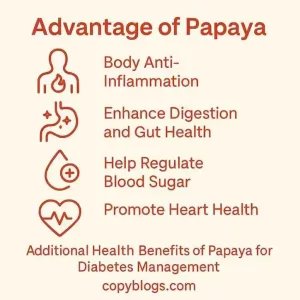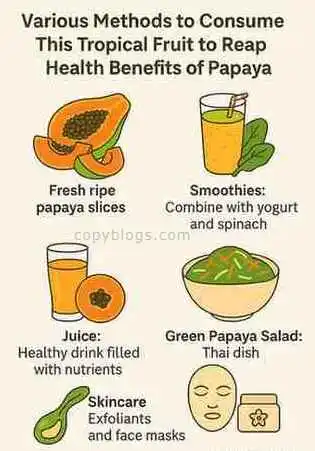
11 Surprising Papaya Benefits
- April 17, 2025
- by
- Shanaya
Christopher Columbus called papaya the “fruit of the angels,” and it’s easy to see why. Packed with essential vitamins, enzymes, and antioxidants, papaya is a nutritional powerhouse that supports numerous aspects of health. From aiding digestion to promoting eye health, papaya offers science-backed benefits—but like any natural remedy, it’s important to understand its risks and interactions as well. In this article, we’ll explore the verified papaya benefits, its nutritional value, medicinal applications, possible side effects, and how it interacts with medications.
Papaya Nutrition Facts
Papaya is a low-calorie, hydrating fruit loaded with essential nutrients. A 100-gram serving delivers vitamins, minerals, and the unique papain enzyme, central to its digestive benefits. Here’s the breakdown:
| Nutrient | Amount per 100g | % Daily Value (DV) |
|---|---|---|
| Calories | 43 kcal | 2% |
| Water | ~88 g | — |
| Carbohydrates | 10.8 g | 4% |
| Sugars | 7.8 g | — |
| Dietary Fiber | 1.7 g | 6% |
| Protein | 0.5 g | 1% |
| Total Fat | 0.3 g | <1% |
| Vitamin C | 60.9 mg | 68% |
| Vitamin A (RAE) | 47 µg | 5% |
| Folate (Vitamin B9) | 37 µg | 9% |
| Vitamin E | 0.3 mg | 2% |
| Potassium | 182 mg | 4% |
| Magnesium | 21 mg | 5% |
| Calcium | 20 mg | 2% |
| Iron | 0.25 mg | 1% |
| Lycopene | Present | — |
| Beta-carotene | Present | — |
| Lutein + Zeaxanthin | Present | — |
| Papain (enzyme) | Present | — |
Note: Percent Daily Values (% DV) are based on a 2,000-calorie diet. Actual daily values may vary depending on individual nutritional needs.
11 Proven Health Benefits of Papaya
From boosting immunity to supporting digestive health, the health benefits of papaya are impressive. This tropical fruit, rich in essential vitamins, enzymes, and antioxidants, offers protection against a wide range of chronic conditions. Here’s a breakdown of the top health benefits of papaya, including its role in fighting disease, promoting gut health, and more.
1. Protect Vision and Eye Health
One of the key advantages of papaya is its strong support for eye health. Papaya is an excellent source of vitamin A and a rich provider of carotenoids like beta-carotene, lutein, zeaxanthin, and lycopene — compounds known to protect eyesight and reduce the risk of age-related eye diseases.
- A cup of sliced papaya contains around 68 mcg of vitamin A, meeting about 33% of the daily value.
- Beta-carotene in papaya helps prevent night blindness and supports overall visual clarity.
- Zeaxanthin acts as a natural filter, protecting the retina from harmful blue light.
- Lycopene, found more abundantly in red-fleshed papayas, protects retinal cells from oxidative stress and inflammation, both of which are key contributors to vision decline. (Trusted source)
These nutrients work together to delay the progression of conditions like macular degeneration and cataracts, especially as we age.
Best foods for good eyesight
2. Fight Diseases and Reduce Cancer Risk
Another major advantage of eating papaya is its role in reducing the risk of chronic disease, including certain cancers. Papaya vitamins, particularly vitamin C and vitamin A, alongside antioxidants like lycopene, beta-carotene, and zeaxanthin, help neutralize free radicals, reduce inflammation, and protect DNA from oxidative damage.
- Research has shown that diets rich in fruits like papaya are linked to a reduced risk of cancers of the breast, colon, prostate, lung, and stomach.
- Lycopene, in particular, is noted for its ability to inhibit the growth of cancerous cells and reduce oxidative stress markers.
- Clinical studies also support the use of fermented papaya extracts in reducing oxidative stress, which plays a major role in chronic inflammation and disease progression. (Trusted Source)
3. Keep Joints Healthy
Maintaining joint health is another advantage of eating papaya. Due to its anti-inflammatory enzymes such as papain, in addition to vitamin C, papaya supports the reduction in swelling of the joints and potentially alleviates symptoms of arthritis.
Research indicates that papaya extracts maintain cartilage health and reduce inflammation in joints, providing a natural alternative to those with chronic joint conditions to manage.
Natural heat therapy for back pain
4. Promote Wound Healing
Papaya facilitates quicker healing of wounds, ulcers, and burns. Papaya enzymes, specifically papain, remove dead skin and facilitate the growth of healthy tissue, while vitamin C stimulates the production of collagen, which is critical in the repair of skin.
Wound dressings from papaya have been utilized successfully in tropical medicine for decades to enhance the healing of open wounds and ulcers.
5. Nurture Skin, Hair, and Nails with Collagen Synthesis
Vitamin C in papaya is very effective in stimulating the production of collagen. Collagen is a body-building protein responsible for tightening the skin, keeping hair tough, and having strong nails.
Consistent papaya consumption may slow down premature aging, combat facial lines and wrinkles, and stimulate the natural healing mechanisms for healthy hair and nails.

Advantage of Papaya
6. Body Anti-Inflammation
The anti-inflammatory benefits of papaya are derived from its content of flavonoids, vitamin C, and proteolytic enzymes such as chymopapain and papain.
These constituents lower the levels of inflammatory mediators like CRP and TNF-alpha, which play roles in chronic conditions such as asthma, arthritis, and IBS.
7. Enhance Digestion and Gut Health
One of the most well-known papaya benefits is its beneficial effect on digestion. Papaya digestive aid is mainly attributed to papain, a natural enzyme that degrades protein and facilitates nutrient absorption.
In addition to digestive enzymes, papaya is also rich in fiber, which ensures bowel regularity, alleviates bloating, and prevents constipation.
8. Help Regulate Blood Sugar
A further benefit of papaya is its ability to assist with blood sugar regulation. Due to its low glycemic index, high fiber content, and antioxidant density, papaya is a potential fruit option for type 2 diabetic patients.
Evidence indicates that consuming papaya in moderation can assist in stabilizing blood glucose and lowering insulin resistance.
9. Promote Heart Health
The benefits of eating papaya are not limited to digestion. Papaya also has positive effects on cardiovascular health. Potassium, fiber, and antioxidants present in papaya regulate blood pressure, reduce LDL cholesterol, and promote general heart function.
Regular intake can lower the risk of heart disease and enhance circulatory system health.
10. Additional Health Benefits of Papaya for Diabetes Management
Aside from controlling blood sugar, the benefits of eating papaya for diabetics is its nutrient and fiber density. It supplies energy without increasing blood sugar when taken in correct amounts.
Papaya’s low calorie and high fiber content can also contribute into healthy weight loss and control.

11. Other Papaya Benefits: Edible Seeds
Though often discarded, papaya seeds are packed with powerful compounds that offer several health-promoting effects:
Anti-parasitic properties help eliminate intestinal worms.
-
- A controlled trial in Nigeria tested the effectiveness of air-dried papaya seeds blended with honey in clearing intestinal parasites among 60 children. The trial revealed that 76.7% of children who took the papaya seed blend had the parasites cleared from their stools after seven days compared to just 16.7% in the control group. No side effects were reported, showing both effectiveness and safety. (Trusted Source)
- Laboratory trials have shown papaya seed extracts to have profound anthelmintic activity. In a test, papaya seed extracts had greater activity compared to albendazole, the reference antiparasitic compound, in terms of inhibiting paralysis and death times of the worms in an in vitro environment. The existence of fixed oils in the seeds was determined as a contributing component to this action.
Though antiparasitic activities, papaya seed uses should be careful:
- Moderation is essential: Overindulgence might result in possible toxicity.
- Consult Healthcare Providers: Before using papaya seeds as a treatment, especially for kids or pregnant women, it is important to consult with medical practitioners.
- Not a Substitute for Medical Treatment: With confirmed parasitic infections, vitamin treatment or the usual medical therapies should not be substituted with papaya seeds without the advice of experts.
Papaya seeds may also have potential advantages in liver detoxification support.
- The addition of papaya seeds to food items, e.g., cakes, has been known to guard against liver damage, holding promise as functional foods that can maintain liver health.
Papaya seeds also has antibacterial properties that fight off harmful microbes.
- Papaya seeds are rich in alkaloids, flavonoids, tannins, saponins, and phenols which have been found to destroy bacteria thus preventing them from growing.
⚠️ Note: Papaya seeds must be eaten in moderation since they have compounds that are toxic when taken in large amounts.
Quick recap: Papaya Benefits- Why Papaya Deserves a Spot in Your Diet
With moderate consumption in foods, papaya supports a wide spectrum of health advantages—from gut healing and immune boosting to eye protection and chronic disease prevention.
Whether enjoyed fresh, in smoothies, or used for its seeds, the benefits of eating papaya are truly worth the spotlight in any healthy diet.
Potential Side Effects and Risks of Papaya
- Pregnant Women: Papaya’s papain in unripe papaya could induce contractions or fetal damage. Ripe papaya is safe in normal amounts.
- Latex Allergy: Papaya latex can trigger hives, itching, or anaphylaxis.
- Asthma: Papain could lead to asthma-like breathing trouble.
- Blood Clots: Papaya could have interactions with blood thinners, and raise the risk of bleeding.
- Surgery: Avoid 2 weeks prior to surgery because it affects blood sugar and clotting.
- Breastfeeding: Safety data inadequate; adhere to food quantities.
- Papain Allergy: Can lead to skin irritation or esophageal injury.
- Excessive Use: Too much papaya can lead to diarrhea or esophageal injury.
- Drug Interactions:
-
- Blood Thinners (e.g., Warfarin): Increases the risk of bleeding.
- Diabetes Medications: Can lead to hypoglycemia.
- Amiodarone: Enhances side effects.
- Levothyroxine: Large doses can decrease effectiveness.
- Anticoagulants
How to Add Papaya to Your Diet
You can consume papaya in a variety of ways.
- When unripe, the flesh is green and can only be consumed if cooked.
- Green papaya is utilized for stir-fries and curries in most Asian dishes.
As it ripens, it turns yellow-orange in color and its characteristic sweetness. A ripe papaya has orange skin that yields to pressure when pressed. - If you buy a papaya to be consumed the same day, pick one that has a reddish-orange skin and is softer. It will probably be ready in a few days on the countertop if it’s still yellow on the outside.
- Consume the fruit at room temperature to allow the sweet flavors and the characteristic papaya taste to be developed.
- If you are going to chop it up, make sure to consume immediately upon cutting to be able to get the most out of the flavor.
- The seeds are warm and can be substituted with pepper to add some spice to salad dressings and sauces.
Various methods to consume this tropical fruit to reap health benefits of papaya.

Conclusion
The papaya benefits—digestion, heart health to skin and eyes—are scientifically substantiated, hence a nutritional wonder. Its papain enzyme, antioxidants, and vitamins provide broad benefits, though in moderation. Talk to your doctor if pregnant, allergic, or on drugs such as blood thinners. Include this “fruit of angels” in your diet for the tasty kick towards wellness!
Choosing organic, non-GMO fruit and adding it to a healthy, balanced diet is an excellent way to reap its special health rewards.
Remember, this article is for informational purposes only and is not a substitute for medical advice. If you have any health conditions or concern, talk with your doctor first.
FAQs
Can I eat papaya on an empty stomach?
Yes, it aids digestion and delivers nutrients. Pair with protein for balance.
Can I eat papaya seeds daily?
They can be beneficial in moderation but not for long-term use.
Does papaya help with weight loss?
Its low calories and high fiber promote fullness, aiding weight loss.
Is papaya safe for everyone?
Generally yes, but pregnant women and people on blood thinners, latex allergy and other health conditions needs a caution.
References:
https://pmc.ncbi.nlm.nih.gov/articles/PMC6286506/
https://pmc.ncbi.nlm.nih.gov/articles/PMC6017803/
https://health.clevelandclinic.org/papaya-benefits
https://www.drugs.com/drug-interactions/papaya.html?
https://www.webmd.com/vitamins/ai/ingredientmono-488/papaya
https://www.sciencedirect.com/science/article/abs/pii/S0889157521001848#https://www.rjptonline.org/HTMLPaper.aspx?Journal=Research%20Journal%20of%20Pharmacy%20and%20Technology;PID=2024-17-9-34









